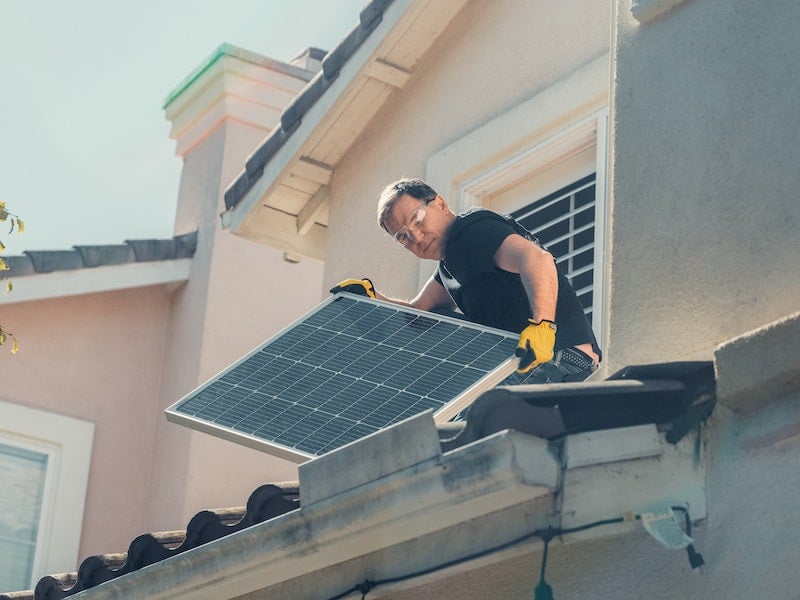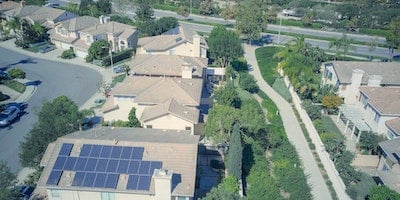
How long do solar panels last?
Solar panels usually last 25-30 years.
Is solar right for you?
Find out in less than a minute.
The lifespan of solar panels
Solar panels usually last 25-30 years.
The industry standard life span of solar panels is 25-30 years. This lifespan varies by the type of solar panel, brand, and environment they are installed in.
We are living in the golden age of solar panels. The adoption of solar panels has grown significantly in the past 20 years and shows no signs of slowing. Thanks in part to renewable energy incentive programs, improvements in technology, and overall decreasing cost of installation.
In fact, the EIA found in a recent study that in 2020 the total shipments of solar panels increased 33%.

How long solar panels last is important to know when you are making a purchasing decision. Though there are incentives and rebates, it is still a hefty investment for most people to make.
Do solar panels get less efficient over time?
Over time solar panels become less efficient. Meaning they produce less electricity from the same amount of light. This process is called degradation. A study from the National Renewable Energy Laboratory found that panels lose anywhere from 0.5 percent to 0.8 percent of their production capacity annually. The rate at which solar panels lose efficiency is called the degradation rate.
The graph below shows the average degradation rate (0.5%) represented linearly. The star is at year 20. The x-axis is years. The y-axis is titled "Power Output of Solar Panels, Compared to Initial Output (%)". This means, this is not the measured efficiency of the solar system. 100% represents the power capacity at the time of the solar panel installation, whatever that may have been. As the system efficiency decreases, it is compared to its original.
If we do a little math, a system that loses 0.5% of its power output every year will still be performing at 90% of its original output at 20 years old! Even if your solar panels degrade at a rate of 0.8%, the system will be at 84% of its original output.

Higher-end solar panels degrade at lower rates. This allows them to produce more electricity over their lifetime, thus reducing their payback period.
Most quality solar panel manufacturers have a 25-year warranty that guarantees that the panel will maintain at least 80% of its original efficiency over its lifetime.
What causes solar panels to become less efficient?
Simply put, extreme weather is the main cause for the decrease in your solar panel lifespan. However, most solar energy systems today are built to take a beating. Many come with a generous warranty period.
Solar panels are built for many types of inclement weather conditions including:
-
Rain
-
High Winds
-
Heavy Snow
-
High Temperatures
-
Hail
-
Freezing Temperatures
With all that said, all solar panels will become less efficient over time thanks to these four main contributing factors:
-
UV Exposure
-
Thermal Cycling
-
Damp Heat
-
Humidity Freeze
UV exposure
Solar panels are exposed to a large amount of ultraviolet (UV) light. Over time the UV rays cause discoloration of the backside of the panel that protects the photovoltaic cells and electrical components that are actually doing the work of converting the sun’s rays into electricity. This process causes those components to work less efficiently.
Thermal cycling
As solar panels are exposed to varying temperatures over the years the electrical connections in the panel become less efficient. Energy is not able to move through the damaged soldered connections as effectively.
Damp heat
Over the years solar panels are damaged by humidity, especially when paid with high temperatures. High heat and humidity cause the insulation around the solar cells to separate.
Humidity freeze
When water, even in trace amounts, freezes in or around your solar panels it causes the various interconnects to work less efficiently.
Other causes of solar degradation
While the above factors are almost impossible to avoid there are two other factors that can cause your system to degrade at an expedited rate.
Light-Induced Degradation: Caused by the solar panel’s boron coating oxidizing and clouding the panels. The phenomena can quickly reduce efficiency by 1 to 3 percent.
Potential-Induced Degradation: While relatively rare in the United States, this occurs when humidity causes electricity leaks that then arc back to the system damaging the internal components.
The main takeaway from all of these causes of degradation is that water and electricity are not good friends.
Do solar panels go bad?
While solar panels certainly become less efficient over time they don’t have an expiration date. They can continue to generate electricity well after their expected 25 - 30 year expected lifespan. Just don’t expect them to work quite as well.
Additionally, it is rare for solar panels to fail before their expected lifespan is complete. The National Renewable Energy Laboratory (NREL) conducted a study that found that only 5 out of 10,000 solar panels fail annually.
That study included all solar panels installed since the year 2000. Since technology has increased greatly in recent years this number is likely much lower for newer solar power systems.
How do you care for solar panels?
There may not be any visible moving parts in PV systems but solar panels require maintenance. Doing proper and regular maintenance for your solar panel system will ensure that they last and perform their best. Here are the top 3 things you can do to make sure your solar panels last longer:
1) Keep Them Clean & Regular Maintenance
Though solar panels require very little maintenance, it is important to clean them regularly. Keeping your panels clear from leaves, snow, tree branches, and dust is one of the most important things to do to maintain a consistent energy output. There can be significantly reduced power output if there is shading on even one panel.
However, getting up on the roof is no easy task for many. You can either reach out to your solar provider to see if they offer cleaning services or if there are many smaller companies that provide these services.
Not as often as cleaning your panels, doing regular maintenance on the entire solar system is vital to preserving your panel performance.
Your PV system is connected to solar inverters which convert your power from Direct Current (DC) to Alternating Current (AC). Unfortunately, inverters won't last as long as your panels. The electro-mechanical will wear in 10-15 years.
This brings us to the next item on our list, monitoring.
2) Monitor Your Solar Panels
In order to maintain your panel performance, setting up a monitoring system will help with determining when to clean your panels or if something is wrong. It allows you to ensure that your system is operating efficiently and effectively.
Through a monitoring system, you can see the comparison of the energy production of the solar system and the energy consumption from your building. The ratio between production and consumption can help you save money on repairs and electricity bill costs in the long run by optimizing your energy usage to ensure you are getting the most of your investment.
Overall, monitoring your solar system is crucial for maintaining its performance and maximizing the benefits of renewable energy and your carbon footprint.
3) Install Correctly
The proper installation of a solar system is crucial to ensure optimal performance and long-term durability. An improperly installed solar system can lead to a range of issues, including reduced efficiency, system failure, and safety hazards. A key component of proper installation is the racking system, which supports and secures the solar panels in place. If the racking system is not installed correctly, it can cause structural damage to the panels or even the roof of the building.
Previously, we spoke about thermal cycling and the wear of wiring and connections. Improper wiring and connections can lead to energy losses and increased fire risk.
Proper installation ensures that the system operates efficiently, safely, and effectively for years to come, providing maximum benefits and savings.
4) Taking Your Solar System to the Next Level:
The following items are optional. If you are looking to have the best of the best solar energy system by investing a little more, here are some other ideas:
Solar Cooling System
Getting a solar cooling system can keep your peak efficiency for longer. A solar cooling rack can be particularly helpful in hotter places where temperatures get very high. Although solar panels are made to sit in the sun, temperatures that are too high be increase their degradation. A cooling system includes tubes that run cool water along the backside of the panels. This water can also be used for domestic use. It can save you further energy by preheating it for sinks and showers.
Third-Party Monitoring
If you aren't interested in monitoring your own system. You can hire a company to monitor your system for you. They will notify you in something is wrong or you are due for maintenance. If you have the money to spare, this is ideal. You don't have to consider the extra learning curve in understanding how your system works and when to do maintenance.
Battery Storage System
Solar panels only work while the sun is out. You can also invest in a battery storage system to optimize your energy usage to match your energy consumption. Enhancing your energy production system with batteries provides you energy freedom and resiliency. In case of a power outage, you have backup power on hand, and you can optimize against peak demand utility prices.
When is it time to replace panels or the entire solar system?
All in all, in answering the question of how long do solar panels last, when to know the time to replace your panels is up to you. PV Panel monitoring is the key factor in answering this question. The monitoring system will tell you the following:
-
If you are no longer producing enough energy to offset your energy consumption (assuming your consumption didn't increase).
-
Similarly, if your system efficiency has dropped below 80%, though panels can continue to work, this generally indicates aging or a high degradation rate if they are under 20 years old.
-
In general, it is recommended to replace the entire system instead of panel by panel.
Written by Thad Warren
Thad is a native Texan who has worked in the energy industry for just over 5 years.
Connect
Recent Posts
Compare Texas Solar Buyback Plans
Discover the best Texas solar energy buy back programs for 2025! Compare rates, terms, and providers to maximize savings and make the most of your solar investment.
September 2025

7 minutes

How Efficient Are Solar Panels
How efficient are solar panels compared to other types of energy generation?
March 2023

4 minutes

What You Need To Know About The California Solar Mandate
Learn how the California Solar Mandate changes how new homes are built.
July 2023

4 minutes


